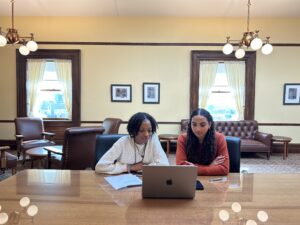
Mental health among teenagers has spiraled as an issue in recent years. In the current crisis, advocates, legislators and youth are advocating for reform this legislative session as a means for change. Those bills in the 2024 session are dedicated to addressing the barriers youth face and take steps to address the mental health crisis among youth.
To learn more about the issue, we interviewed the Kirsten Anderson, director of AspireMN. AspireMN is a nonprofit dedicated to improving the lives of youth and families through advocacy and providing resources. This session, AspireMN’s legislative agenda prioritizes preserving children’s mental health treatment.
ThreeSixty also spoke with Rep. Heather Edelson who is leading legislative efforts to support teen mental health resources.
This interview has been edited for length and clarity.
Why is it important to advocate for mental health reform for children and teenagers?
We are in a place of crisis because of the lack of access to early intervention and prevention care or simply timely services as needed. We see too many kids and families having to rely on a crisis system; and we see that coming through children who are boarding in hospitals, children who are boarding in juvenile detention, children who are boarding those counties. We know we can build the system that kids and families need to get the kind of treatment that that they deserve.
What were past obstacles that stopped mental health resources?
We’re really in the midst of building that mental health continuum that we need. The real message is that we are on a journey, and we haven’t arrived at the kind of system that kids and families really need. I don’t necessarily think that there have been fundamental barriers. It’s just the lack of momentum, or the lack of investment, to be frank – we’ve had a broken rate structure for a decade. We need investment to build the system of our future.
What are barriers you face advocating for mental health reform?
Parity and stigma. We have an environment where we have been underpaid for the last decades, and that’s kind of a historic experience. That is true today. That parity is not being fully implemented. So, we have an underpayment problem, and I don’t want to get held up by the notion that it’s all about the investment in the money; but if you don’t have the fuel, you can’t do the work.
Why is it important to start making changes now?
It’s abundantly clear to our elected officials that we are in crisis, and we can make the choices to build what we need for kids and families. And it’s not the system of yesterday. It’s the system of the future, and we have the resources that we need to build that system, we just need to make the investments.
Tamia worked with Sahan Journal reporter Alfonzo Galvan to finish her story. This story was completed at ThreeSixty’s Winter News Team: Capitol Edition in February 2024, where high school journalists covered important legislative issues, impacting Minnesota youth. Read more stories here.
